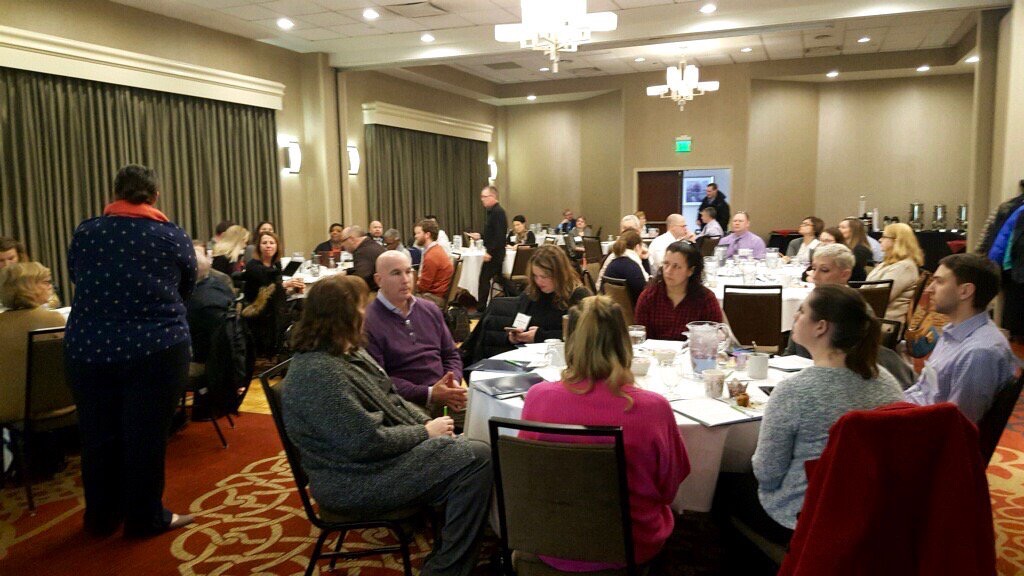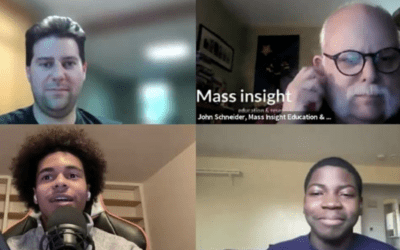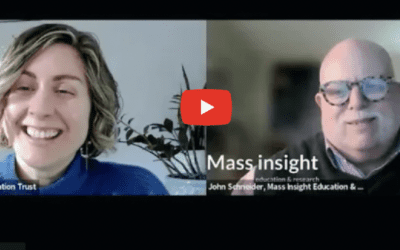The Boulder Fund grant will allow Mass Insight to pilot a new program targeting middle school readiness. May. 22, 2025 –Boston– Mass Insight Education & Research’s President and CEO, Andrea Wolfe, has been selected in the 2025 cohort of Education Leaders of...
Gateway to College Success Network: Key Takeaways
On January 11, 2018, teams from the five Gateway City school districts participating in the Gateway to College Success (GCS) Network, for which Mass Insight Education serves as the hub, gathered in Marlborough to review the progress to date and plan their next steps. The Cross-District Convening included leadership and instructional teams from Fitchburg, Holyoke, New Bedford, Springfield, and Worcester.
The goal of the GCS Network is to improve horizontal and vertical alignment of instruction for students in grades 6 – 12. The network grew out of MIE’s work with these cities through our AP STEM and English program. When we asked superintendents to think about how we can continue to expand the pool of students accessing and succeeding in advanced coursework, the importance of aligning instruction arose as a critical need. MIE is supporting districts as they apply improvement science principles and strategies to their district-specific problems of practice under this umbrella of alignment.
Over the course of an intense and engaging day, nearly 60 participants reflected on three key questions:
- What does it take to initiate this approach to improvement work?
- How is such work sustained?
- What will it take to continue to expand and scale this work?
During discussions both within their district teams and across districts, some key themes and learnings emerged. First, participants were clear that this approach to improvement is enormously valuable. Indeed, one participant noted that the improvement strategies rolled out through the GCS Network have been the most valuable professional development in her more than 10 years of district service. Convening participants described high investment in this work, citing the flexibility of an approach that asks participants to engage in rapid, iterative improvement cycles rather than waiting months or years to evaluate efficacy and the emphasis on figuring out how to make research-based strategies work in their specific district contexts.
Second, participants discussed that teachers need time and structures to engage in meaningful collaboration. This is easy to say, but providing adequate time for teachers, coaches, and leaders to collaborate across grade levels, buildings, and districts in systems that were designed to be more self-contained is a challenge at multiple levels. Districts need to consider how they allocate resources; principals need to change how their buildings are scheduled; and teachers need support in using opportunities for such collaboration effectively, especially as new concepts – such as improvement science – are introduced to frame this work.
Finally, participants described how much they appreciate that this approach to improvement is user-friendly. Improvement science values missteps, gaps in knowledge, and pain points because they provide opportunities to learn and information about why specific ideas aren’t working. Thus, as the GCS Network schools embrace the improvement science way of thinking, they are creating safe spaces in which participants can acknowledge what they don’t know without feeling ashamed or punished – and in which teams can collaborate together on site-specific solutions that help both students and teachers grow.
As we look toward our next Convening in April, MIE will be helping schools consider how far beyond their Network teams these ideas and approaches are spreading, how to accelerate that spread, and how to expand this work to new teachers, content areas, and schools in the coming months and years.
Click here for more information about the Gateways Network.

Recent Posts
Cybersecurity Event Introduces Students to Cyber Careers
For the 5th year in a row, Mass Insight Education & Research is hosting the Cybersecurity and You Workshop to introduce Advanced Placement® (AP) STEM high school students to cybersecurity scenarios and concepts as well as postsecondary education and career paths....
Adolescent Literacy Crisis: IES Guide In Action – Webinar
What does the evidence say about how schools can improve the adolescent literacy crisis happening in our country? In this webinar, we explore the Institute of Education Sciences Reading Intervention Guide for Grades 4 through 9, found here, and diving into two of the...
You may also like
An Interview with Mass Insight AP Students and their Teacher
https://youtu.be/mQTeW8-sX40 We sat down with two Mass Insight AP STEM & English Program students, Ben and Chris-Ander, and their teacher, William Pellegrino, to hear about their educational journeys, their experiences in AP classes and as vocational students, and...
An Interview with Kristen Hengtgen of The Education Trust
https://youtu.be/1ZfxNShHJOU?si=d1a1GoVrgrDWT5Cu Kristen Hengtgen, Ph.D. is a senior analyst on The Education Trust's P-12 policy team and co-author of their new report, Increasing Access to Advanced Coursework in Massachusetts. In this interview, she joins Mass...
Creating the conditions for greater success of systemically disadvantaged students in AP: Next steps for the Massachusetts AP STEM & English program
Recently the New York Times published an article entitled, Why is the College Board Pushing to Expand Advanced Placement? The article focuses on an important issue: there’s been greater growth in AP participation for Black and Latino students and students living in...



